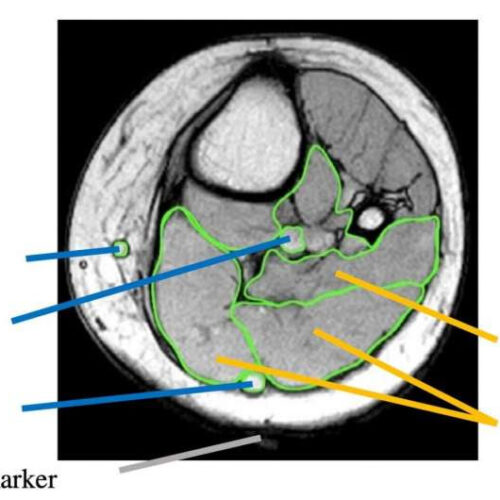NATIONAL INSTITUTE FOR HEALTH RESEARCH Patients with lasting symptoms of COVID-19 who completed a six week, supervised rehabilitation programme demonstrated significant improvements in exercise capacity, respiratory symptoms, fatigue and cognition, according to researchers at the National Institute for Health Research (NIHR) Leicester Biomedical Research Centre – a partnership between Leicester’s Hospitals, the University of Leicester...
Category: <span>Physical Medicine</span>
Sports stars’ kinesiology tape injury treatment makes ‘no difference’
by University of Dundee The four different test conditions: (A) barefoot (B) shoes (C) tape with bare feet (D) tape with shoes. Credit: BMJ Open Sport & Exercise Medicine (2020). DOI: 10.1136/bmjsem-2019-000604 It has been adopted by the likes of Cristiano Ronaldo, Tiger Woods and Andy Murray as a colorful way to help them play through pain, but research from...
Leg muscle action assists blood flow independently of age
by Kanazawa University T1WI with muscle and vein ROI set on the T1WI of the cross section at the center of the marker. Muscle area was measured for GAS and SOL. The vein area was measured for the PV and the GSV and SSV. PV, popliteal vein;GAS, gastrocnemius muscle; SOL, soleus muscle; GSV, great saphenous vein;...
Keeping fit with HIIT really does work
THE PHYSIOLOGICAL SOCIETY High intensity interval training has become increasingly popular as it’s a quick and effective way to improve health. This is all the more important as countries around the world emerge from lockdowns due to coronavirus and are looking for quick and easy way to exercise again. Recently, researchers have been studying whether...
Web-delivered exercise and tailored texts improve knee arthritis therapy
by Cheryl Critchley, University of Melbourne Credit: CC0 Public Domain A new online program enhanced by text messages to help people with knee osteoarthritis exercise has been found to improve knee pain, physical function and quality of life, new research reveals. The University of Melbourne-led study developed and tested a free 24-week exercise program combining a...
New research finds slumped posture not such a pain in the neck after all
by Curtin University Credit: Unsplash/CC0 Public Domain Curtin University research in partnership with the Raine Study has cast doubt on the popular belief that having a slumped posture while seated can lead to neck pain. Published in “Physical Therapy,” the research found females in late adolescence who sat in a slumped position compared to upright posture had a lower risk of experiencing persistent neck pain as a...
Histamine-suppressing drugs found to reduce benefits of exercise
by Bob Yirka , Medical Xpress In an interventional RCT, the role of histamine H1/H2 receptor signaling for exercise training adaptations was investigated. By chronic blockade of histamine H1/H2 receptors in humans, we show that integrative adaptations related to insulin sensitivity, vascular function and aerobic capacity are dependent on histamine signaling. Credit: Wim Derave A...
No pain, no gain in exercise for peripheral artery disease
by Marla Paul, Northwestern University Credit: Pixabay/CC0 Public Domain No pain means no gain when it comes to reaping exercise benefits for people with peripheral artery disease (PAD), reports a new Northwestern Medicine study. In people with peripheral artery disease, walking for exercise at an intensity that induces ischemic leg pain (caused by restricted blood flow) improves walking performance—distance and length...
A strong coffee half an hour before exercising increases fat-burning
by University of Granada The scientists have demonstrated that consuming caffeine (about 3 mg/kg or the equivalent of a strong coffee) half an hour before aerobic exercise significantly increases fat-burning. Credit: University of Granada Scientists from the Department of Physiology of the University of Granada (UGR) have shown that caffeine (about 3 mg/kg, the equivalent of...
Researchers identify barriers to use of surface electromyography in neurorehabilitation
KESSLER FOUNDATION IMAGE: Rakesh Pilkar, Ph.D. is a Senior Research Scientist in the Center for Mobility and Rehabilitation Engineering Research at Kessler Foundation and Assistant Research Professor in the Department of Physical Medicine & Rehabilitation at Rutgers – New Jersey Medical School. Dr. Pilkar’s expertise is in providing engineering solutions to biomedical research problems. CREDIT:...








